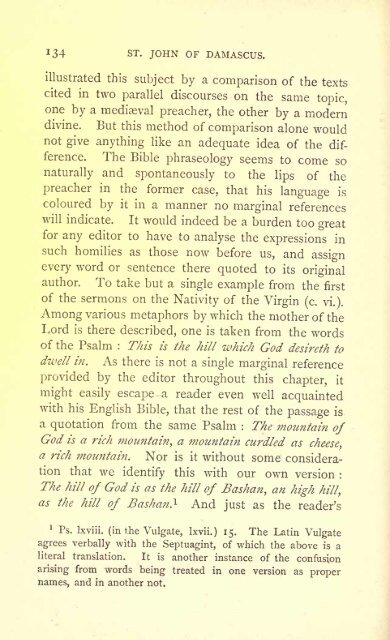st. john of damascus (676-749 - Cristo Raul
st. john of damascus (676-749 - Cristo Raul
st. john of damascus (676-749 - Cristo Raul
Create successful ePaper yourself
Turn your PDF publications into a flip-book with our unique Google optimized e-Paper software.
J<br />
34 ST. JOHN OF DAMASCUS.<br />
illu<strong>st</strong>rated this subject by a comparison <strong>of</strong> the texts<br />
cited in two parallel discourses on the same topic,<br />
one by a mediaeval preacher, the other by a modern<br />
divine. But this method <strong>of</strong> comparison alone would<br />
not give anything like an adequate idea <strong>of</strong> the dif<br />
ference. The Bible phraseology seems to come so<br />
naturally and spontaneously to the lips <strong>of</strong> the<br />
preacher in the former case, that his language is<br />
coloured by it in a manner no marginal references<br />
will indicate.<br />
It would indeed be a burden too great<br />
for any editor to have to analyse the expressions in<br />
such homilies as those now before us, and assign<br />
every word or sentence there quoted to its<br />
original<br />
author. To take but a single example from the fir<strong>st</strong><br />
<strong>of</strong> the sermons on the Nativity <strong>of</strong> the Virgin (c.<br />
vi.).<br />
Among various metaphors by which the mother <strong>of</strong> the<br />
Lord is there described, one is taken from the words<br />
<strong>of</strong> the Psalm : This is the hill which God desireth to<br />
dwell in. As there is not a single marginal reference<br />
provided by the editor throughout this chapter, it<br />
might easily escape a reader even well acquainted<br />
with his English Bible, that the re<strong>st</strong> <strong>of</strong> the passage is<br />
a quotation from the same Psalm : The mountain <strong>of</strong><br />
God is a rich mountain, a mountain curdled as cheese,<br />
a rich mountain. Nor is it without some considera<br />
tion that we identify this with our own version :<br />
The hill <strong>of</strong> God is as the hill <strong>of</strong> Bashan, an high hill,<br />
as the hill <strong>of</strong> Bashan^ And ju<strong>st</strong> as the reader s<br />
Ps. Ixviii. (in the Vulgate, Ixvii.) 15. The Latin Vulgate<br />
1<br />
agrees verbally with the Septuagint, <strong>of</strong> which the above is a<br />
literal translation. It is another in<strong>st</strong>ance <strong>of</strong> the confusion<br />
arising from words being treated in one version as proper<br />
names, and in another not.
















